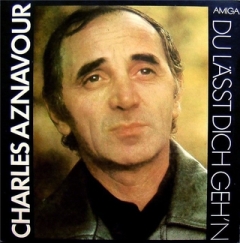Charles Aznavour - Du lasst dich geh`n (1972)
Charles Aznavour - Du lasst dich geh`n (1972)

1. Charles Aznavour - 01 Du labt dich geh n (3:43) 2. Charles Aznavour - 02 La Boheme (3:04) play 3. Charles Aznavour - 03 Ich halte dich schon warm (3:16) 4. Charles Aznavour - 04 Wie sie sagen (4:59) 5. Charles Aznavour - 05 La Mamma (3:45) 6. Charles Aznavour - 06 Und trotzdem lieb ich sie (2:58) 7. Charles Aznavour - 07 Tans Wange an Wange mit mir (4:35) 8. Charles Aznavour - 08 Mit dir kam das Gluck (3:12) 9. Charles Aznavour - 09 Spiel Zigeuner (3:48) 10. Charles Aznavour - 10 Deine 17 Jahre (2:21) play 11. Charles Aznavour - 11 Fur mich-For Me Formidable (2:25) 12. Charles Aznavour - 12 Nein, ich vergab nichts davon (6:26)
Born in Paris to an Armenian family, sad-eyed, sinewy singer/composer Charles Aznavour started performing as a dancer at age nine. During the 1950s, Aznavour rose to stardom as a soulful interpreter of melancholy romance ballads. Many filmgoers assume that his film debut was as the gangster-obsessed musician in Truffaut's Shoot the Piano Player (1962), but in fact Aznavour made his first film, Le Tete Contre les Murs, in 1959. Many of his movie roles have been in the same noirish vein as his Piano Player performance; in the 1975 remake of Ten Little Indians, he was on screen only long enough to brood over his miserable past and sing a sad refrain before he is poisoned. Busy in films as both performer and composer into the late 1980s, Aznavour is the sort of wordly, hard-shelled performer who'd seem naked without a cigarette dangling from his lips and a half-consumed drink on the top of the piano. ~ Hal Erickson, allmusic.com
Charles Aznavour, właśc. Szanur Vaginak Aznavurian (ur. 22 maja 1924 w Paryżu) – francuski kompozytor, piosenkarz i aktor filmowy pochodzenia ormiańskiego.
Charles Aznavour – niewysokiego wzrostu, obdarzony charakterystycznym głosem[3] stał się w 2 poł. XX wieku jedną z najbardziej rozpoznawalnych postaci światowej muzyki rozrywkowej. Skomponował około 1000 piosenek (w tym ok. 150 po angielsku, 100 po włosku, 70 po hiszpańsku i 50 po niemiecku). Sprzedał ponad 100 milionów płyt na całym świecie[4].Wystąpił w ponad 60 filmach.
Aznavour bywa nazywany często francuskim Frankiem Sinatrą. Tematem jego piosenek jest na ogół miłość. Artysta mówi i śpiewa w wielu językach: po francusku, angielsku, włosku, neapolitańsku, hiszpańsku, niemiecku, rosyjsku, portugalsku i oczywiście po ormiańsku. W tym ostatnim języku nagrał XVIII-wieczną pieśń Sayat Nova. Z kolei piosenka Que C'est Triste Venise (Jakże smutna jest Wenecja) została przez niego zaśpiewana w rekordowej liczbie wersji: włoskiej (Com'è Triste Venezia), hiszpańskiej (Venecia Sin Ti), angielskiej (How Sad Venice Can Be) i niemieckiej (Venedig im Grau).
download (mp3 @VBR kbs):
yandex mega mediafire cloudmailru ulozto
Last Updated (Monday, 01 October 2018 21:51)








